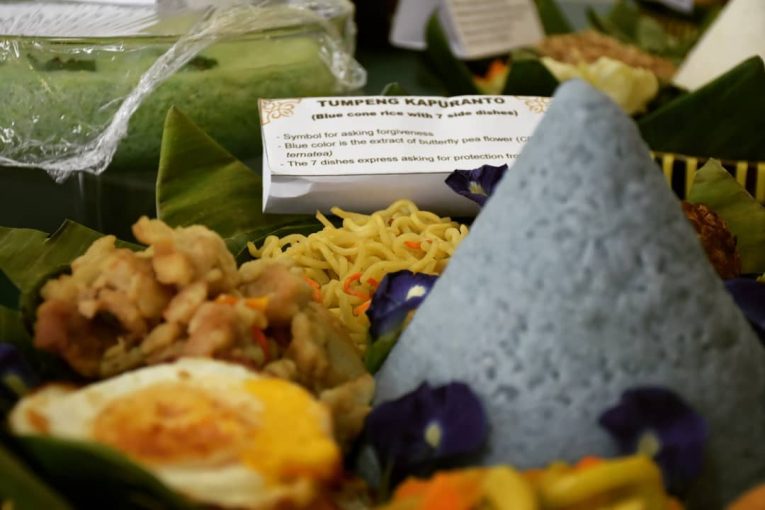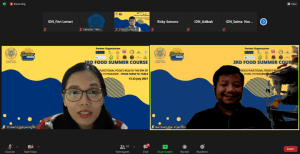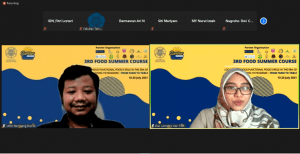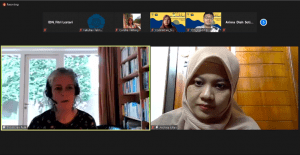
The fourth day of the 3rd summer course on food with the theme of Local Indigenous Functional Food’s Roles in The Era of Covid19 Pandemic: From Farm to Table was held on July 16th, 2021. On this day, the activity was divided into 4 sessions including virtual trip and discussion, material elaboration by Dr. Widiastuti Setyaningsih, Dr. Dwi Larasatie N F and Prof. Saskia van Ruth. In the first session, the participants joined virtual community visits and discussed edible flowers and their utilization in the participants origin area.
 The second session, the lecture was delivered by Dr. Widiastuti Setyaningsih about “Extraction of Active Compounds from Edible Flowers”. Dr. Widi explained about her research, which extraction of active compounds from edible flowers, the essentials of edible flower and analytical methods to take advantage of the edible flowers. The major compound in bioactive compounds included in fruit flowers and ornamental flowers is the phenolic acid. This compound makes edible flowers have many functionality such as the antioxidant, anti-inflammatory, antimicrobial, anticancer, neuroprotective agent, antidiabetic, uricosuric agent, and anti-hemolytic. To optimize the results of phenolic components, extraction methods were developed including maceration, UAE (ultrasound-assisted extraction) and MAE (microwave-assisted extraction).
The second session, the lecture was delivered by Dr. Widiastuti Setyaningsih about “Extraction of Active Compounds from Edible Flowers”. Dr. Widi explained about her research, which extraction of active compounds from edible flowers, the essentials of edible flower and analytical methods to take advantage of the edible flowers. The major compound in bioactive compounds included in fruit flowers and ornamental flowers is the phenolic acid. This compound makes edible flowers have many functionality such as the antioxidant, anti-inflammatory, antimicrobial, anticancer, neuroprotective agent, antidiabetic, uricosuric agent, and anti-hemolytic. To optimize the results of phenolic components, extraction methods were developed including maceration, UAE (ultrasound-assisted extraction) and MAE (microwave-assisted extraction).
 The third session, the material elaboration by Dr. Dwi Larasatie about “Functional Food Product Development”. Dr. Dwi started the lecture with learning three generic perspectives, including business development perspective, company perspective, and product development perspective. Dr. Dwi also explained about the role of customer and market evaluation, marketing plans, production and product launching. Dr. Dwi explains the material then participants practice the material that has been explained and closed by presentations from several participants.
The third session, the material elaboration by Dr. Dwi Larasatie about “Functional Food Product Development”. Dr. Dwi started the lecture with learning three generic perspectives, including business development perspective, company perspective, and product development perspective. Dr. Dwi also explained about the role of customer and market evaluation, marketing plans, production and product launching. Dr. Dwi explains the material then participants practice the material that has been explained and closed by presentations from several participants.
 The last session, the lecture was delivered by Prof. Saskia van Ruth from Wageningen University and Research, The Netherland, about “Food Fraud Prevention and Detection in Herbs and Spices and Supply Chain Networks”. Prof. Saskia opened the lecture discussing fraud in every aspect of life. And she focused it on food fraud including deceit and it was done on purpose and for raking more money. The first main topic is discussing factors in food frauds’ aspect are ingredients and constituents, geographical origin, production system, and processing. Spices are the most expensive products in the supermarket so it is the most fragile type of food that gets fraud. Also the longer the supply chains are the more misty, and could become easier and more tempting to do food fraud. Economic drives also play a big role as the price of the specific food is increasing the more people want to commit food fraud for their own profits.Prof. Saskia also presented her survey regarding students’ integrity quiz. The results of the survey was that dishonesty is everywhere, not just in food fraud. There are also many fraud monitoring detection methods, including chromatography, mass spectrometry, DNA based techniques, immunology, physical test, wet chemistry, etc. Prof. Saskia ended the lecture by mentioning the system and the development in preventing food fraud in the future heading for analyses of integrated decision support tools (ICT systems), big data and citizen science.
The last session, the lecture was delivered by Prof. Saskia van Ruth from Wageningen University and Research, The Netherland, about “Food Fraud Prevention and Detection in Herbs and Spices and Supply Chain Networks”. Prof. Saskia opened the lecture discussing fraud in every aspect of life. And she focused it on food fraud including deceit and it was done on purpose and for raking more money. The first main topic is discussing factors in food frauds’ aspect are ingredients and constituents, geographical origin, production system, and processing. Spices are the most expensive products in the supermarket so it is the most fragile type of food that gets fraud. Also the longer the supply chains are the more misty, and could become easier and more tempting to do food fraud. Economic drives also play a big role as the price of the specific food is increasing the more people want to commit food fraud for their own profits.Prof. Saskia also presented her survey regarding students’ integrity quiz. The results of the survey was that dishonesty is everywhere, not just in food fraud. There are also many fraud monitoring detection methods, including chromatography, mass spectrometry, DNA based techniques, immunology, physical test, wet chemistry, etc. Prof. Saskia ended the lecture by mentioning the system and the development in preventing food fraud in the future heading for analyses of integrated decision support tools (ICT systems), big data and citizen science.
